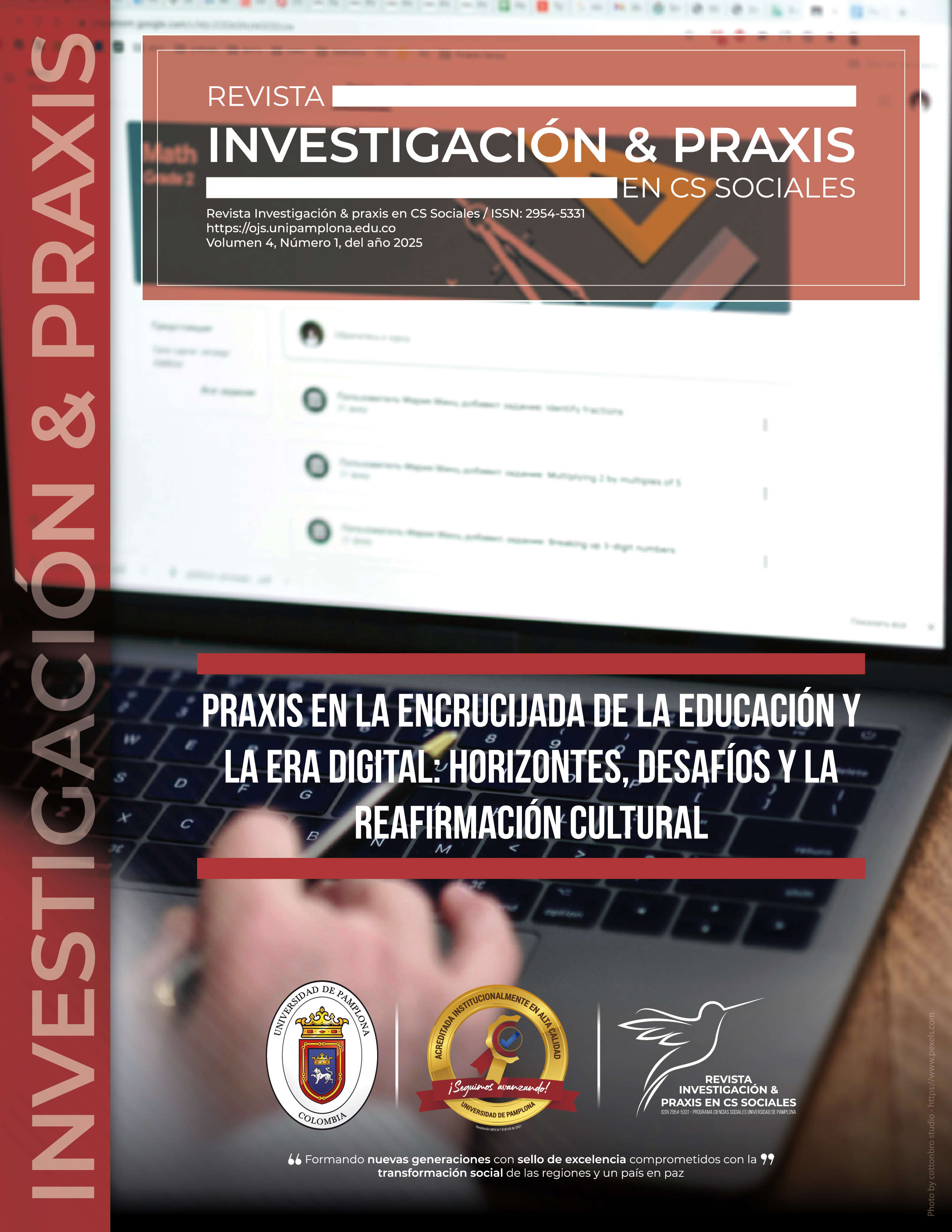Shared Horizons: A Bibliographic Study on Generative Artificial Intelligence in Basic Education, Its Human Echoes, Challenges, and the Pursuit of Meaningful Learning (2020-2024)
DOI:
https://doi.org/10.24054/ripcs.v4i1.4010Keywords:
Generative Artificial Intelligence, 21st century education, Personalized Learning, 21st-Century Skills, Digital Humanism, Educational Ethics, Bibliographic Study, 2020-2024Abstract
Generative Artificial Intelligence (GenAI) established itself in the educational landscape of basic education between 2020 and 2024, generating both expectations and profound reflections. This bibliographic study aimed to analyze, from a humanistic perspective, the impact of GenAI during this period. It examined the opportunities it offered for personalizing learning and developing 21st-century skills, as well as the ethical, pedagogical, and social challenges that emerged. Through a systematic review of academic literature published between 2020 and 2024, key trends were identified, and implications for the educational community were discussed. The findings of this review suggested that while GenAI presented promising tools, its integration required careful planning, continuous teacher training, and a student-centered approach to mitigate risks such as technological dependence, algorithmic bias, and the digital divide, always seeking to preserve the human essence of the educational act.
References
Bender, E. M., Gebru, T., McMillan-Major, A., & Shmitchell, S. (2021). On the Dangers of Stochastic Parrots: Can Language Models Be Too Big? In Proceedings of the 2021 ACM Conference on Fairness, Accountability, and Transparency (pp. 610–623). Association for Computing Machinery.
Benjamin, R. (2019). Race after technology: Abolitionist tools for the new Jim Code. Polity Press.
Braun, V., & Clarke, V. (2006). Using thematic analysis in psychology. Qualitative Research in Psychology, 3(2), 77–101.
Braun, V., & Clarke, V. (2019). Reflecting on reflexive thematic analysis. Qualitative Research in Sport, Exercise and Health, 11(4), 589-597.
Buckingham, D. (2023). Tech-ucation: Critical perspectives on digital learning and the new logics of education. Routledge.
Carr, N. (2020). The shallows: What the internet is doing to our brains (2nd ed.). W. W. Norton & Company.
Cooper, H., Hedges, L. V., & Valentine, J. C. (Eds.). (2019). The handbook of research synthesis and meta-analysis (3rd ed.). Russell Sage Foundation.
Deci, E. L., & Ryan, R. M. (2000). The "what" and "why" of goal pursuits: Human needs and the self-determination of behavior. Psychological Inquiry, 11(4), 227–268.
Eaton, S. E. (2021). Plagiarism in higher education: Tackling tough topics in academic integrity. Libraries Unlimited.
Floridi, L., Cowls, J., Beltramini, M., Saunders, D., Vayena, E., ... & Taddeo, M. (2018). An ethical framework for a good AI society: Opportunities, risks, principles, and recommendations. AI & Society, 33(4), 689-707.
García-Peñalvo, F. J., & Alonso-de-Prado, A. M. (2023). Inteligencia artificial
Goodfellow, I., Bengio, Y., & Courville, A. (2020). Deep learning. MIT Press.
Livingstone, S., & Helsper, E. J. (2021). The LSE handbook of media, education and digital literacy. SAGE.
Long, D., & Magerko, B. (2020). What is AI Literacy? Competencies and Design Considerations. In Proceedings of the 2020 CHI Conference on Human Factors in Computing Systems (pp. 1–16). Association for Computing Machinery.
Luckin, R., Holmes, W., Griffiths, M., & Forcier, L. B. (2016). Intelligence Unleashed: An argument for AI in Education. Pearson.
Mishra, P., & Koehler, M. J. (2006). Technological Pedagogical Content Knowledge: A framework for teacher knowledge. Teachers College Record, 108(6), 1017–1054.
Mitchell, M. (2019). Artificial intelligence: A guide for thinking humans. Farrar, Straus and Giroux.
Noble, S. U. (2018). Algorithms of oppression: How search engines reinforce racism. New York University Press.
OECD (2018). The Future of Education and Skills: Education 2030. OECD Publishing.
OpenAI. (2023). GPT-4 Technical Report. arXiv:2303.08774.
Page, M. J., McKenzie, J. E., Bossuyt, P. M., Boutron, I., Hoffmann, T. C., Mulrow, C. D., ... & Moher, D. (2021). The PRISMA 2020 statement: an updated guideline for reporting systematic reviews. BMJ, 372, n71.
Pane, J. F., Steiner, E. D., Baird, M. D., & Hamilton, L. S. (2017). Informing progress: Insights on personalized learning implementation and effects. RAND Corporation.
Partnership for 21st Century Skills (P21). (2019). Framework for 21st Century Learning. P21.org.
Petticrew, M., & Roberts, H. (2006). Systematic reviews in the social sciences: A practical guide. Blackwell Publishing.
Piaget, J. (1952). The origins of intelligence in children. International Universities Press.
Sancho-Gil, J. M., Rivera-Vargas, P., & Miño-Puigcercós, R. (2020). Moving beyond the predictable arguments: The paradox of ICT and education in the time of COVID-19. Comunicar, 28(65), 9-17. https://doi.org/10.3916/C65-2020-01
Selwyn, N. (2022). EdTech: A critical look at the digital future of education. Polity Press.
Tondeur, J., Scherer, R., Siddiq, F., & Baran, E. (2021). Understanding the grassroots of educational technology integration: A systematic review of the literature on teachers’ beliefs. Educational Research Review, 34, 100401.
UNESCO (2023a). ChatGPT and Artificial Intelligence in higher education: Quick start guide. UNESCO.
UNESCO (2023b). Guidance for generative AI in education and research. UNESCO.
Van Dijk, J. A. G. M. (2020). The digital divide. Polity Press.
Vaswani, A., Shazeer, N., Parmar, N., Uszkoreit, J., Jones, L., Gomez, A. N., ... & Polosukhin, I. (2017). Attention is all you need. In Advances in Neural Information Processing Systems 30 (pp. 5998–6008). Curran Associates, Inc.
Vygotsky, L. S. (1978). Mind in society: The development of higher psychological processes. Harvard University Press.
Zawacki-Richter, O., Marín, V. I., Bond, M., & Gouverneur, F. (2019). Systematic review of research on artificial intelligence applications in higher education – where are the educators? International Journal of Educational Technology in Higher Education, 16(1), 39.
Published
How to Cite
Issue
Section
License
Copyright (c) 2025 Marisa Alejandra Lara Escobar

This work is licensed under a Creative Commons Attribution 4.0 International License.










